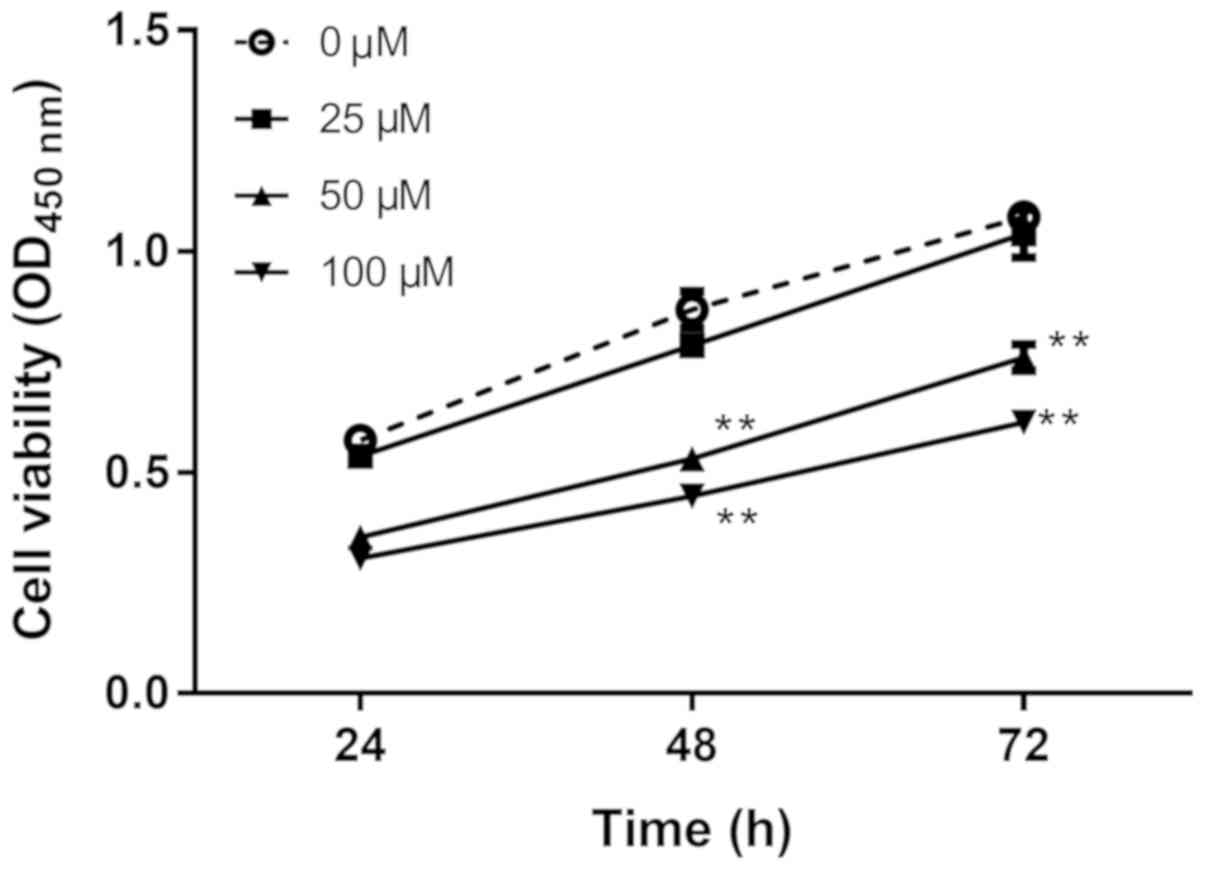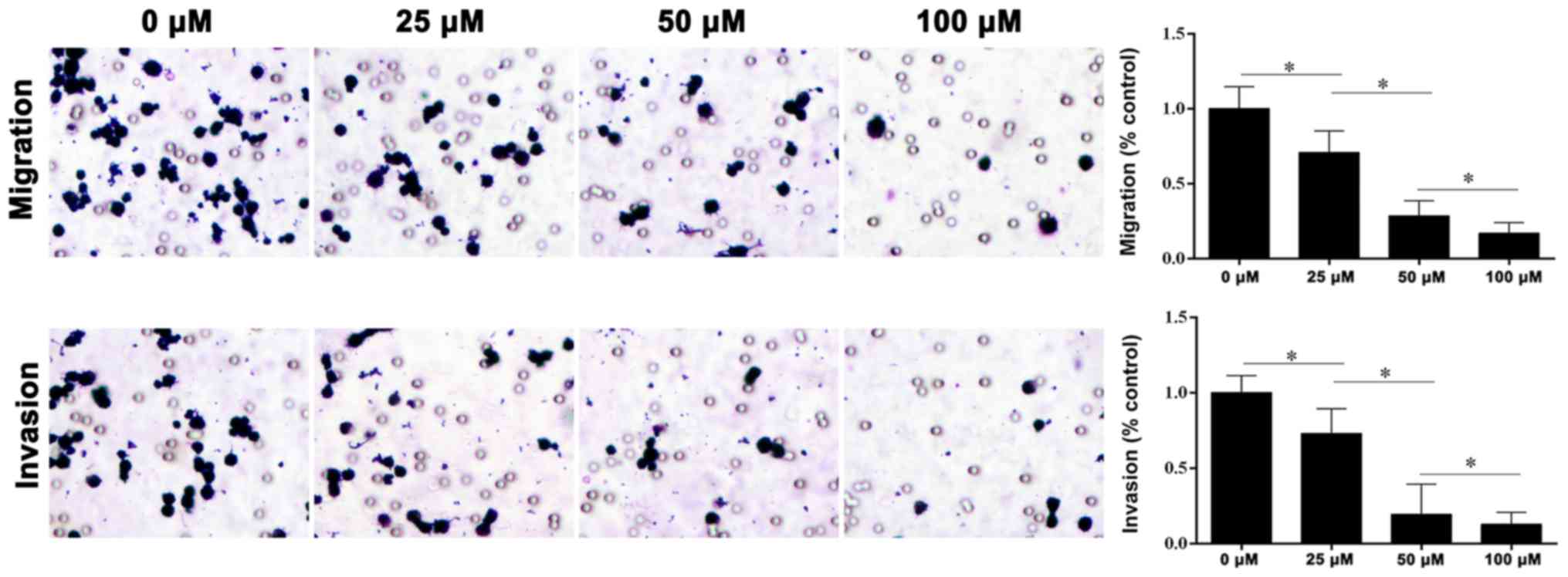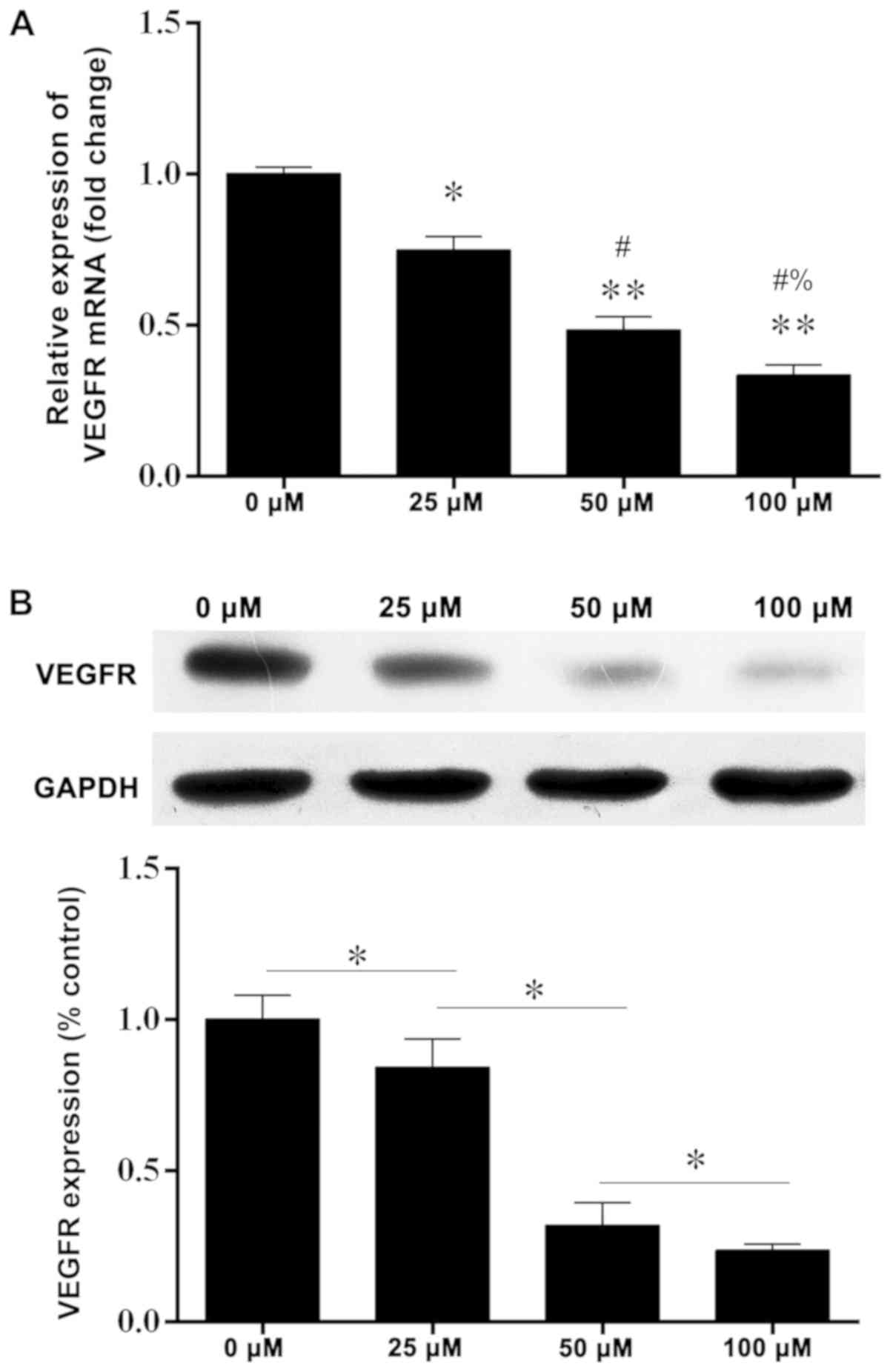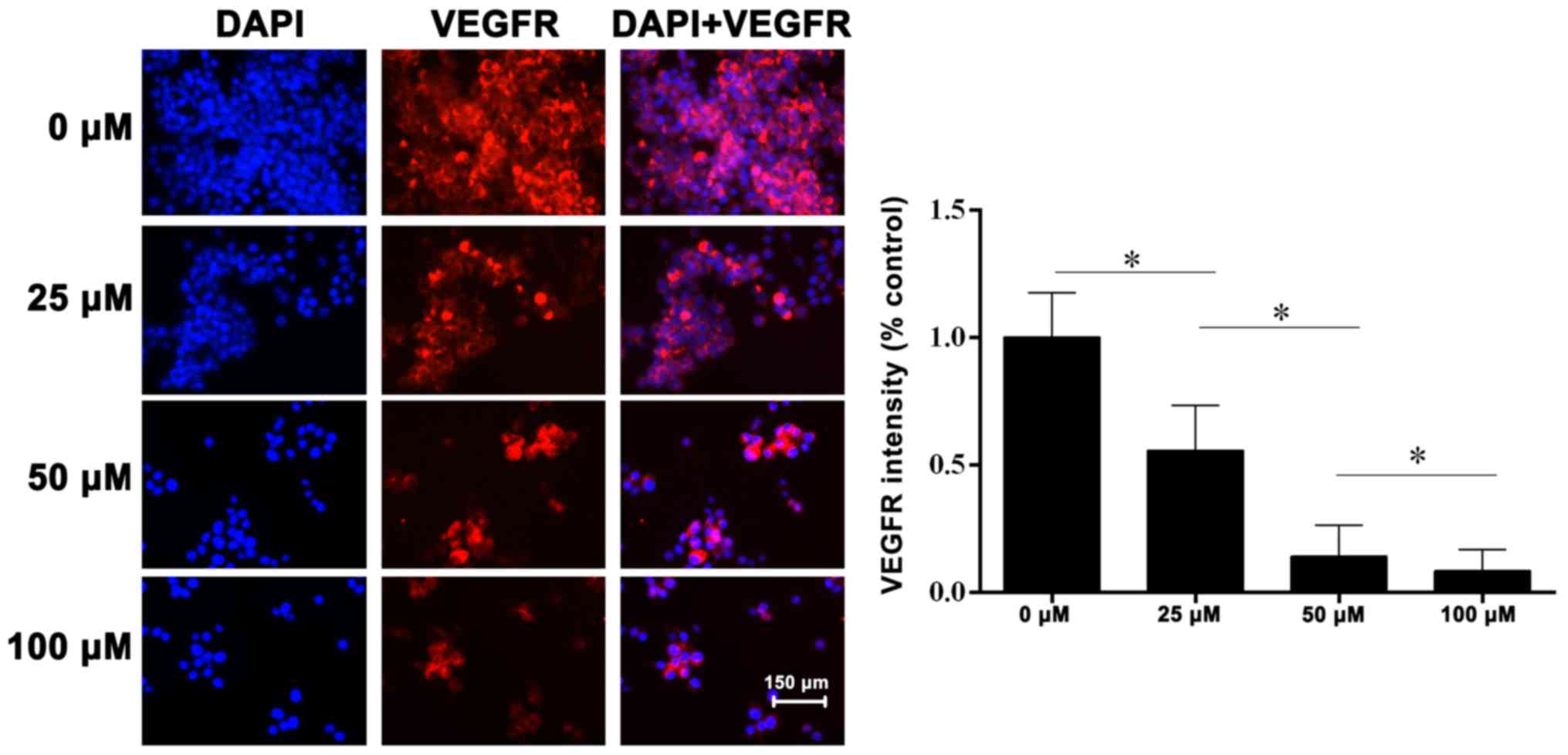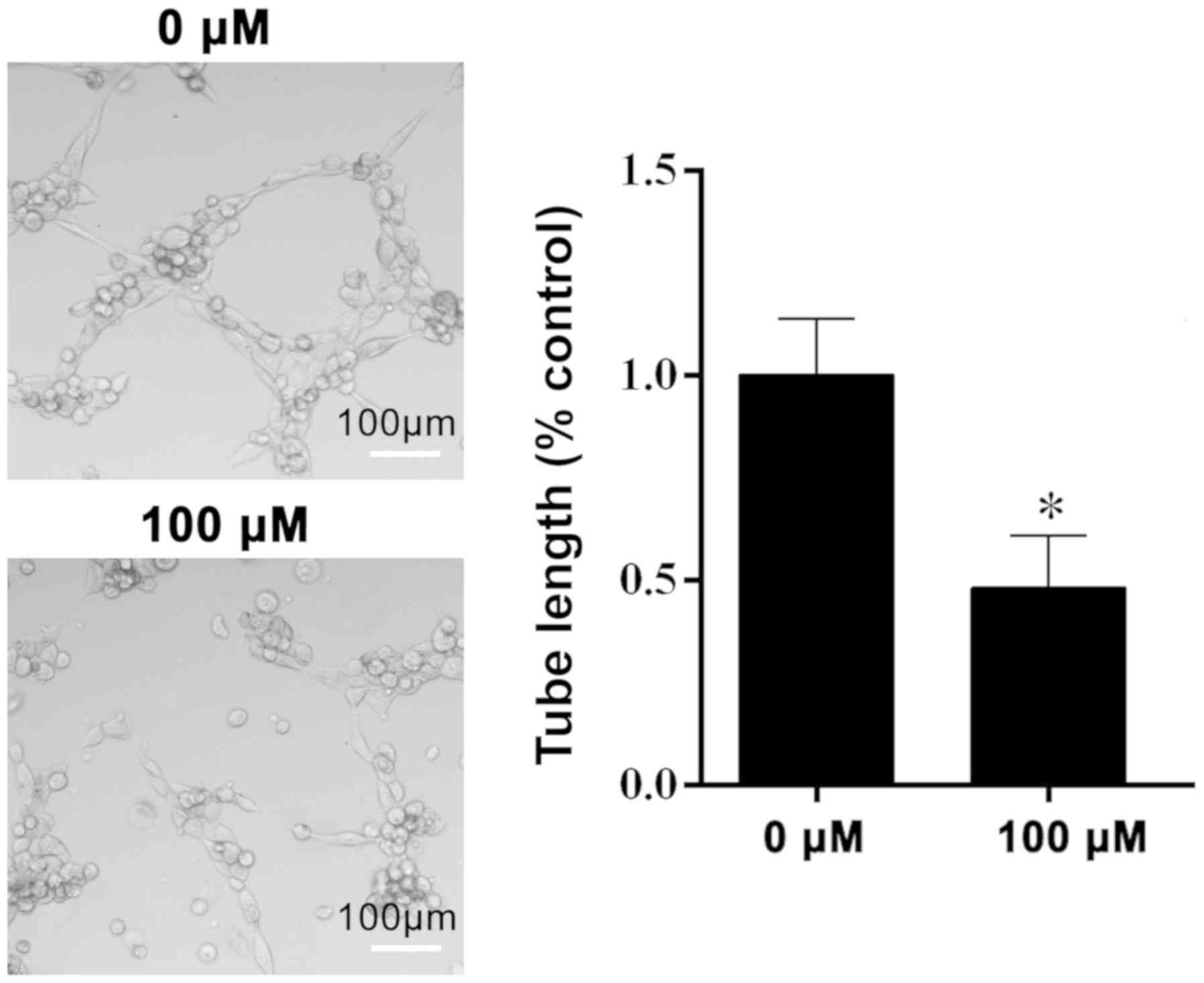|
1
|
Shchyogolev AI, Dubova EA and Tumanova UN:
Vascularization of hepatocellular carcinoma tissue depends on its
differentiation degree. Bull Exp Biol Med. 153:490–494. 2012.(In
English, Russian). View Article : Google Scholar : PubMed/NCBI
|
|
2
|
Zeng Y, Yao X, Liu X, He X, LI L, Liu X,
Yan Z, Wu J and Fu BM: Anti-angiogenesis triggers exosomes release
from endothelial cells to promote tumor vasculogenesis. J Extracell
Vesicles. 8:16298652019. View Article : Google Scholar : PubMed/NCBI
|
|
3
|
Folkman J: Role of angiogenesis in tumor
growth and metastasis. Semin Oncol. 29 (6 Suppl 16):S15–S18. 2003.
View Article : Google Scholar
|
|
4
|
Yan Z, Liu J, Xie L, Liu X and Zeng Y:
Role of heparan sulfate in mediating CXCL8-induced endothelial cell
migration. PeerJ. 4:e16692016. View Article : Google Scholar : PubMed/NCBI
|
|
5
|
Takayama K, Ueno H, Nakanishi Y, Sakamoto
T, Inoue K, Shimizu K, Oohashi H and Hara N: Suppression of tumor
angiogenesis and growth by gene transfer of a soluble form of
vascular endothelial growth factor receptor into a remote organ.
Cancer Res. 60:2169–2177. 2000.PubMed/NCBI
|
|
6
|
Färkkilä A, Anttonen M, Pociuviene J,
Leminen A, Butzow R, Heikinheimo M and Unkila-Kallio L: Vascular
endothelial growth factor (VEGF) and its receptor VEGFR-2 are
highly expressed in ovarian granulosa cell tumors. Eur J
Endocrinol. 164:115–122. 2011. View Article : Google Scholar : PubMed/NCBI
|
|
7
|
Guo S, Colbert LS, Fuller M, Zhang Y and
Gonzalezperez RR: Vascular endothelial growth factor receptor-2 in
breast cancer. Biochim Biophys Acta. 1806:108–121. 2010.PubMed/NCBI
|
|
8
|
Bhat TA and Singh RP: Tumor angiogenesis-a
potential target in cancer chemoprevention. Food Chem Toxicol.
46:1334–1345. 2008. View Article : Google Scholar : PubMed/NCBI
|
|
9
|
Jung MH, Sun HL, Ahn EM and You ML:
Decursin and decursinol angelate inhibit VEGF-induced angiogenesis
via suppression of the VEGFR-2-signaling pathway. Carcinogenesis.
30:655–661. 2009. View Article : Google Scholar : PubMed/NCBI
|
|
10
|
Tosetti F, Ferrari N, De Flora S and
Albini A: Angiopreventio: Angiogenesis is a common and key target
for cancer chemopreventive agents. FASEB J. 16:2–14. 2002.
View Article : Google Scholar : PubMed/NCBI
|
|
11
|
Albini A, Noonan DM and Ferrari N:
Molecular pathways for cancer angioprevention. Clin Cancer Res.
13:4320–4325. 2007. View Article : Google Scholar : PubMed/NCBI
|
|
12
|
Fotsis T, Pepper MS, Aktas E, Breit S,
Rasku S, Adlercreutz H, Wähälä K, Montesano R and Schweigerer L:
Flavonoids, dietary-derived inhibitors of cell proliferation and in
vitro angiogenesis. Cancer Res. 57:2916–2921. 1997.PubMed/NCBI
|
|
13
|
Paper DH: Natural products as angiogenesis
inhibitors. Planta Med. 64:686–695. 1998. View Article : Google Scholar : PubMed/NCBI
|
|
14
|
Adhami VM, Syed DN, Khan N and Mukhtar H:
Dietary flavonoid fisetin: A novel dual inhibitor of PI3K/Akt and
mTOR for prostate cancer management. Biochem Pharmacol.
84:1277–1281. 2012. View Article : Google Scholar : PubMed/NCBI
|
|
15
|
Park HH, Lee S, Oh JM, Lee MS, Yoon KH,
Park BH, Kim JW, Song H and Kim SH: Anti-inflammatory activity of
fisetin in human mast cells (HMC-1). Pharmacol Res. 55:31–37. 2007.
View Article : Google Scholar : PubMed/NCBI
|
|
16
|
van Acker FA, Schouten O, Haenen GR, van
der Vijgh WJ and Bast A: Flavonoids can replace alpha-tocopherol as
an antioxidant. FEBS LETT. 473:145–148. 2000. View Article : Google Scholar : PubMed/NCBI
|
|
17
|
Khan N, Asim M, Afaq F, Abu ZM and Mukhtar
H: A novel dietary flavonoid fisetin inhibits androgen receptor
signaling and tumor growth in athymic nude mice. Cancer Res.
68:8555–8563. 2008. View Article : Google Scholar : PubMed/NCBI
|
|
18
|
Khan N, Afaq F, Syed DN and Mukhtar H:
Fisetin, a novel dietary flavonoid, causes apoptosis and cell cycle
arrest in human prostate cancer LNCaP cells. Carcinogenesis.
29:1049–1056. 2008. View Article : Google Scholar : PubMed/NCBI
|
|
19
|
Liao YC, Shih YW, Chao CH, Lee XY and
Chiang TA: Involvement of the ERK signaling pathway in fisetin
reduces invasion and migration in the human lung cancer cell line
A549. J Agric Food Chem. 57:8933–8941. 2009. View Article : Google Scholar : PubMed/NCBI
|
|
20
|
Suh YS, Afaq F, Johnson JJ and Mukhtar H:
A plant flavonoid fisetin induces apoptosis in colon cancer cells
by inhibition of COX2 and Wnt/EGFR/NF-kappaB-signaling pathways.
Carcinogenesis. 30:3002009. View Article : Google Scholar : PubMed/NCBI
|
|
21
|
Chen YC, Shen SC, Lee WR, Lin HY, Ko CH,
Shih CM and Yang LL: Wogonin and fisetin induction of apoptosis
through activation of caspase 3 cascade and alternative expression
of p21 protein in hepatocellular carcinoma cells SK-HEP-1. Arch
Toxicol. 76:351–359. 2002. View Article : Google Scholar : PubMed/NCBI
|
|
22
|
Lim DY and Park JH: Induction of p53
contributes to apoptosis of HCT-116 human colon cancer cells
induced by the dietary compound fisetin. Am J Physiol Gastrointest
Liver Physiol. 296:G1060–G1068. 2009. View Article : Google Scholar : PubMed/NCBI
|
|
23
|
Si Y, Liu J, Shen H, Zhang C, Wu Y, Huang
Y, Gong Z, Xue J and Liu T: Fisetin decreases TET1 activity and
CCNY/CDK16 promoter 5hmC levels to inhibit the proliferation and
invasion of renal cancer stem cell. J Cell Mol. 23:1095–1105. 2019.
View Article : Google Scholar
|
|
24
|
Livak KJ and Schmittgen TD: Analysis of
relative gene expression data using real-time quantitative PCR and
the 2(-Delta Delta C(T)) method. Methods. 25:402–408. 2001.
View Article : Google Scholar : PubMed/NCBI
|
|
25
|
Zeng Y, Yao X, Chen L, Yan Z, Liu J, Zhang
Y, Feng T, Wu J and Liu X: Sphingosine-1-phosphate induced
epithelial-mesenchymal transition of hepatocellular carcinoma via
an MMP-7/syndecan-1/TGF-β autocrine loop. Oncotarget.
7:63324–63337. 2016. View Article : Google Scholar : PubMed/NCBI
|
|
26
|
Chen C, Yu DC and Teng LS: Development of
anti-tumor drugs targeting VEGF/VEGFR: a progress. Chin J Cancer
Biother. 3:291–295,300. 2007.(In Chinese).
|
|
27
|
Folkman J: Tumor angiogenesis: Therapeutic
implications. N Engl J Med. 285:1182–1186. 1971. View Article : Google Scholar : PubMed/NCBI
|
|
28
|
Gupta MK and Qin RY: Mechanism and its
regulation of tumor-induced angiogenesis. World J Gastroenterol.
9:1144–1155. 2003. View Article : Google Scholar : PubMed/NCBI
|
|
29
|
Cherrington JM, Strawn LM and Shawver LK:
New paradigms for the treatment of cancer: The role of
anti-angiogenesis agents. Adv Cancer Res. 79:1–38. 2000. View Article : Google Scholar : PubMed/NCBI
|
|
30
|
Grimm D, Bauer J and Schoenberger J:
Blockade of neoangiogenesis, a new and promising technique to
control the growth of malignant tumors and their metastases. Curr
Vasc Pharmacol. 7:347–357. 2009. View Article : Google Scholar : PubMed/NCBI
|
|
31
|
Singh RP, Dhanalakshmi S, Agarwal C and
Agarwal R: Silibinin strongly inhibits growth and survival of human
endothelial cells via cell cycle arrest and downregulation of
survivin, Akt and NF-kappaB: Implications for angioprevention and
antiangiogenic therapy. Oncogene. 24:1188–1202. 2005. View Article : Google Scholar : PubMed/NCBI
|
|
32
|
Kaufmann SH, Desnoyers S, Ottaviano Y,
Davidson NE and Poirier GG: Specific proteolytic cleavage of
poly(ADP-ribose) polymerase: An early marker of
chemotherapy-induced apoptosis. Cancer Res. 53:3976–3985.
1993.PubMed/NCBI
|
|
33
|
Kraizer Y, Mawasi N, Seagal J, Paizi M,
Assy N and Spira G: Vascular endothelial growth factor and
angiopoietin in liver regeneration. Biochem Biophys Res Commun.
287:209–215. 2001. View Article : Google Scholar : PubMed/NCBI
|
|
34
|
Masood R, Cai J, Zheng T, Smith DL, Hinton
DR and Gill PS: Vascular endothelial growth factor (VEGF) is an
autocrine growth factor for VEGF receptor-positive human tumors.
Blood. 98:19042001. View Article : Google Scholar : PubMed/NCBI
|
|
35
|
Tian X, Song S, Wu J, Meng L, Dong Z and
Shou C: Vascular endothelial growth factor: Acting as an autocrine
growth factor for human gastric adenocarcinoma cell MGC803. Biochem
Biophys Res Commun. 286:505–512. 2001. View Article : Google Scholar : PubMed/NCBI
|
|
36
|
Bray F, Ferlay J, Soerjomataram I, Siegel
RL, Torre LA and Jemal A: Global cancer statistics 2018: GLOBOCAN
estimates of incidence and mortality worldwide for 36 cancers in
185 countries. CA Cancer J Clin. 68:394–424. 2018. View Article : Google Scholar : PubMed/NCBI
|















